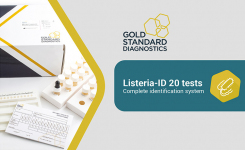The European Centre for Disease Control (ECDC) and Prevention alongside the European Food Safety Authority (EFSA) are working with EU member states to monitor the outbreak as well as any new additional cases.
Multiple countries have traced the outbreak to eggs from Poland. The use of epidemiological testing, whole genome sequencing and traceback investigation has linked the source of the outbreak to an egg packing facility located in the Wielkopolska province, Poland. Across Europe, recalls are ongoing and distribution of eggs to EU member states has ceased.
The seven affected countries include Belgium, Denmark, Luxembourg, the Netherlands, Norway, Sweden and the UK. Additionally, nine of the confirmed cases are linked to a travel history to Hungary or Poland.
A total number of 260 illnesses have been reported between 1st May and 12th 2016 with 112 of these cases confirmed. A five year old child’s death in Croatia has also been linked to a cluster of Salmonella Enteritidis (SE) cases, associated epidemiologically with the outbreak.
Outbreak Strain a Concern Since 2012 In the EU, officials have been tracing two clusters of Salmonella infections since February 2012. A technical report issued jointly by the EFSA and ECDC states:
“The first isolates belonging to one of the (whole genome sequence) WGS clusters associated with this outbreak were identified in 2012. The number of confirmed and probable cases has increased steadily since May 2016,”
and
“The sampling time between the different food isolates belonging to the WGS clusters associated with this outbreak detected in the Netherlands and Norway demonstrates that products contaminated with the outbreak strain from the packing center in Poland have been distributed to different EU countries on multiple occasions in a period of at least seventeen months between May 2015 and October 2016.”
The EFSA have released an official statement regarding this recent outbreak which can be viewed here: http://www.efsa.europa.eu/en/supporting/pub/1110e
International variations in egg standards: Food safety standards vary for eggs internationally and undergo revisions as evidence dictates. For example, In July 2016 the UK Food Standards Agency (FSA) published a review of advice to consumers on eating raw or lightly cooked shell eggs and their products. This was revised and updated by an expert group organised by the Advisory Committee on the Microbiological Safety of Food (ACMSF).
The group, looking at egg safety found there has been a reduction in the risk of contracting salmonella in UK shell eggs since its previous report on the issue 15 years ago. They hence concluded that the risk for UK hen shell eggs produced under the Lion code scheme or other equivalent comprehensive schemes should be considered as very low and recommended that these types of eggs can be served raw or lightly cooked to vulnerable groups including the young, the pregnant and the elderly with the exclusion of severely immunocomprised persons. The report also recommends that for other hen shell eggs which includes non-UK eggs consumed in the UK the risk level is to be considered low.
Historically, due to Salmonella, the FSA and Food Standards Scotland (FSS) advice had been that “raw eggs, eggs with runny yolks or any food that is uncooked or only lightly cooked and contains raw eggs may cause food poisoning, especially in ‘at risk’ groups.”
Now, the FSA and FSS will advise that raw, soft-boiled hen eggs or foods which contain lightly cooked hen eggs are not likely to cause illness in people of good health. They will also discontinue advising against the consumption of raw or lightly cooked eggs by vulnerable groups given that the eggs are produced under the Lion code quality assurance scheme except in the case of extremely immunocompromised persons. Current advice of non-shell hen eggs will not change.
In the US, eggs upon purchase are recommended to be refrigerated by consumers as United States Department of Agriculture (USDA) graded eggs are washed and sanitised before packaging for storage to minimise contamination of the egg shell. The EU stance, however is that washing may favour trans-shell contamination in addition to moisture loss potentially posing a risk to the consumer therefore across the EU eggs are not washed.
Interestingly, in association with the recent SE outbreak Dr Lesley Larkin, head of Salmonella surveillance at Public Health England stated that although risk remains very low it is important to both wash hands thoroughly and ensure food is thoroughly cooked.

















